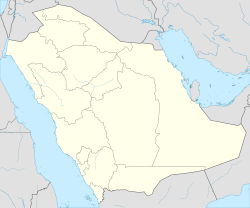As Suwayriqiyah | |
|---|---|
Village | |
| Coordinates: 23°21′N40°19′E / 23.350°N 40.317°E | |
| Country | |
| Province | Al Madinah Province |
| Time zone | UTC+3 (EAT) |
| • Summer (DST) | UTC+3 (EAT) |
As Suwayriqiyah is a village in Al Madinah Province, in western Saudi Arabia. [1] The village lies to the northeast of Al Jissah.
